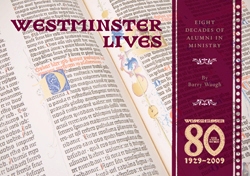Eight Decades of Alumni in MinistrySeptember 07, 2009
1929 – First convocation, Sept. 25 Purchase via alumni@wts.edu
Preface by Author Barry Waugh The following book is a tiny sample of the many students that have been graduated by Westminster Seminary. These few represent the men and women who have set aside two to three years, sometimes several more, to prepare themselves for their callings by specializing in the Bible and applying it in some particular field of Christian service. Preparation includes biblical studies, systematic and biblical theologies, apologetics, practical theology, missiology, church history, and other areas for more specialized ministries. The author has attempted to provide a fair sample of the graduates, though the few presented here cannot do justice to the variety of nations, races, denominations, and backgrounds that have been represented on campus during Westminster’s history. It was the intention to select individuals that might not be commonly known to many in the Westminster community believing that there are many untold stories of God’s grace working in the lives of his servants. For the author, the comments regarding these people that he would most like to hear are, “I did not know that he/she was a Westminster graduate,” or “Westminster graduates serve in that country,” or “I did not know that about that person.” The author admits that there are sure to be some imbalances, oversights, and omissions, but it is hoped that this booklet still manages to present a nice variety of graduates and ministries. Of course, these interesting lives raises the question, “How many more stories are there in the history of Westminster that would be just as interesting and show the amazing work of God’s kingdom?” The author is grateful to the many relatives and descendants who have provided information concerning many of the deceased and living graduates. Most of the information here has come via digital correspondence with the living subjects and the kin of the deceased. In some cases, photographs have been provided by family members and the subjects themselves. The staff of the Montgomery Library has been especially helpful and gone the “second mile”—maybe even a third or fourth—to help the author with resources for these biographies. The administrative offices of Westminster Seminary, the members of the board, and the faculty have also been helpful with providing information. The administrative offices of the Orthodox Presbyterian Church (OPC) and the staff of the PCA Historical Center have been responsive and provided considerable assistance. The author is especially appreciative and honored that President Lillback and Vice President Garner invited him to write this book. Please note that despite the historical inaccuracy of using the abbreviation “OPC” for the Orthodox Presbyterian Church through its whole history, the author is going to use it for convenience and clarity. Even though it is more accurate to say Presbyterian Church of America for 1936 to 1939, then OPC for 1939 on, the author believes this is confusing in light of the current use of Presbyterian Church in America (PCA). For this book, the succession of divinity degrees has been standardized as follows: classes through 1938 all received a certificate; classes from 1939 through 1949 are described as receiving the ThB; classes from 1950 through 1972 are said to have received the BD; classes from 1973 through 1977 are designated as receiving the MDiv; classes from 1978 through 1984 received the MAR for two years work plus the MDiv for the additional divinity year; and from 1985 through to the most current class divinity students have received the MDiv as a single, three year degree. Of course, all these clean sharp lines are blurred by the fact that students could opt-into the newer program or stay in the older one, and another complicating factor is that earlier students could pay a fee to have their certificates upgraded to the ThB. Westminster Seminary does not exist for its faculty, administration, bookstore, library, or board of trustees but instead exists to be God’s tool for educating his servants for their callings. The seminary bears the great responsibility of teaching its students the truths of Reformed doctrine as expressed in the doctrinal summary of Scripture provided by the Westminster Standards, but it also enjoys the privilege of seeing its alumni “go out into all the world and make disciples.” |






